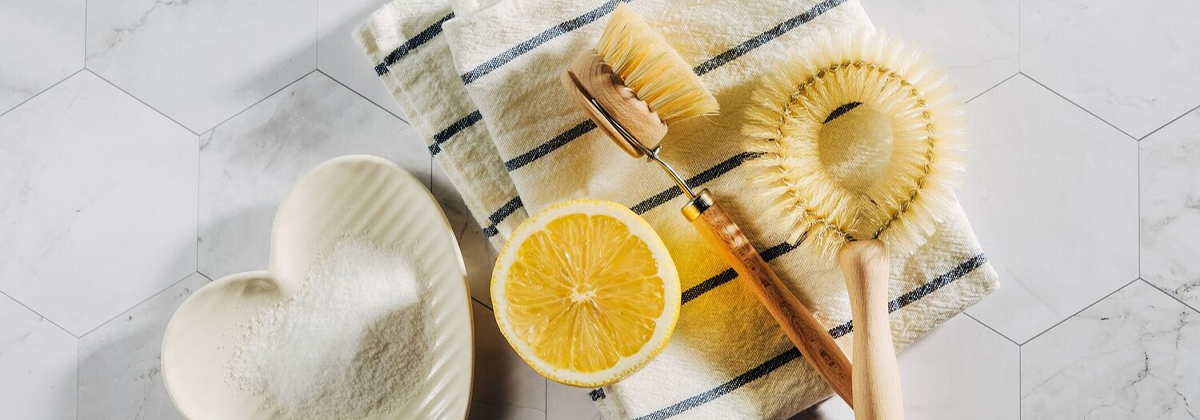09 Feb Natural Alternatives to the Bleach (Part 1)
Perhaps you are also looking for natural alternatives to detergents or bleach due to environmental concerns or sensitivity to chemicals. It’s time to give up chemical detergents because chemical cleaners, apart from damaging surfaces, have many adverse effects on our health and can be allergenic. Also, these materials are the source of damage to the environment! Therefore, it’s better to know the natural alternatives to chemical detergents. By using these alternatives, we can guarantee the health of the environment and most importantly, our family.
Bleach, the most widely used detergent
Today, bleach has a special position as the most widely used detergent. It’s a type of whitening liquid that can be used in many cases. In general, the use of bleaching liquid is considered to destroy deep pollution. While this product is one of the most dangerous liquids used in life. In the past, one of its side effects was the release of chlorine gas and a bad smell. With the advancement of science and technology, mankind was able to solve this problem. Therefore, this product is produced and marketed with various pleasant scents.
The importance of bleach and its applications in life
One of the most prominent applications of bleach is washing ceramics, tiles and stones in bathrooms and kitchens. Because these surfaces are places that are more likely to cause pollution and dirt. Therefore, strong detergents should be used to clean them. Other benefits of bleach include removing stains from white clothes and fabrics. So that after use, the clothes can be delivered completely clean, white and without stains. Also, this solution can destroy any kind of fungi, microbes and bacteria. As a result, it’s a very suitable option for disinfecting the desired area. Removing bad and unpleasant odours is also one of the other uses of this product.
Harmful chemical detergents for the environment
The concern of many of us these days is the excessive use of detergents and the harmful effects of detergents on the environment. While these materials have made our lifestyle more comfortable, they can have a lot of negative effects on the environment. The entry of detergents into the sewage in terms of the indestructibility of the group of hard detergents and the formation of foam, etc., has caused the pollution of water resources and the environment. So, for a long time, detergents have attracted the attention of environmental officials due to their pollution of water.
consequences
- Destruction of the ecosystem.
- Killing bacteria and beneficial microscopic organisms in nature.
- The entry of toxins into the waters and its effect on living beings.
- Creating a physiological reaction in the consumption of polluted water.
- The indestructibility of the group of hard detergents.
- Formation of foam on surface water.
- Changing the smell and taste of water.
- Creating favourable conditions for the growth of microbes and disease.
Harms of chemical detergents on humans
Gas and steam caused by acidic detergents such as bleach not only cause damage to the respiratory system but also affect the eyes and skin of people who are exposed to it. The severity of these complications depends on the length of time these substances are used, and the symptoms of poisoning with detergents may not be very noticeable at first. Be very careful when using chemical detergents and bleaches in closed spaces such as bathrooms and toilets, because they cause poisoning and symptoms similar to asthma, the effects of which aren’t completely resolved. So, when using these detergents, follow the safety principles listed on the product and use protective coverings such as masks to prevent severe skin, eye and respiratory damage.
consequences
In general, in case of using non-standard materials, exposure to chemicals and not using covers such as gloves and aprons, the following complications can occur:
- Skin burns are caused by contact with acidic substances.
- Eye and iris damage is caused by contact with chemical vapour or liquid.
- Respiratory sensitivities and long-term effects on the lungs are caused by the gas of detergent chemicals.
- Poisoning and in severe cases, death.
- Damage to the fetus in pregnant women.
But fortunately, you don’t always need to use chemicals for washing. In this article, we introduce some natural alternatives to household detergents.
Natural alternative to detergents
If you have shortness of breath after using chemical detergents, or if your family members feel a headache, or if the clothes are damaged by chemical detergents and even your skin is allergic, it’s better to have a good change in your life by choosing these methods.
Descaling with baking soda
Baking soda is an excellent cleaner and deodorizer. Combine it with vinegar to clean and remove stains and spray on surfaces for a total surprise! Baking soda is a wonderful natural alternative for removing grease from kitchen utensils, removing stains from clothes and surfaces, and disinfecting the environment. It’s also a good alternative for cleaning sinks, bathtubs and bathroom tiles. Just remember that baking soda shouldn’t be used on aluminium surfaces.
Tea tree oil
Another alternative to bleach is tea tree oil, which you can use as a disinfectant and bleaching liquid. Just mix a few drops of tea tree oil with warm water in a spray bottle and spray it on your floor, counter, bathroom and appliances. Cleaning these areas of your home will not only be easier, but it will also smell good.
Disinfectant with borax
Borax is an excellent substitute for bleach. You can mix it with washing powder to make your clothes clean. Borax is also a useful disinfectant and cleaner. Try mixing it with water and use it to clean dirty surfaces like the toilet. Borax is a disinfectant that removes the hardness of water and causes more soap foam. It’s also suitable for cleaning walls and wallpaper and cleans sticky stains on the floor well.
Glass and surface cleaner with cornstarch
Cornstarch is a great alternative for cleaning and polishing all types of windows, fibreglass doors and other glass surfaces. Corn starch is also used to remove hard stains and carpet stains. Just mix an equal amount of vinegar alcohol and warm water in a container or bottle. The temperature of the water should be normal and it shouldn’t be too boiling. Now add a spoonful of corn powder to this solution and stir them well so that the corn powder dissolves well inside the solution. Spray on the surface and see the cleanliness. The best detergent for washing carpets is this combination. For oily stains on the carpet, pour cornstarch on the stains, apply a little, wait at least 20 minutes, and then clean with a vacuum cleaner.
Natural soap without fragrance (unscented)
Natural odourless soap is a biodegradable cleaning solution that can be used to clean various surfaces. You can use soap in the mould, liquid and grated form. Look for handmade, natural soaps that don’t contain artificial colours, fragrances, or additives. You can buy natural soap or make it yourself at home.
The preparation of soap is very easy and there are many types. For example, to make natural wood and soil soap at home, the base oil of this soap is enough from a combination of oils such as coconut oil, rapeseed oil (canola is one of the oilseed plants in temperate regions), castor oil, sesame oil, shea butter (a type of fat that comes from ( Shea tree seed is extracted) and kokum butter (kokum butter or kokum butter, an oil obtained from the seeds of a tree called kokum), with lime and aromatic oils such as oil from cedar wood. The result of this idea is a smoky marble soap with a distinct scent that is found in the most fragrant colognes.
Castile soap
Castile soap is made from olive oil and is another useful alternative to bleach. Unlike many soaps that contain chemicals, castile soap is biodegradable and safe to use around children. Try to dilute it with water and use it to clean the bathroom, dishes and floors. You can also use it together with vinegar, baking soda and borax in the laundry along with detergents.
Olive oil for cleaning steel
The sink, steel dishes and drain baskets lose their shine after a while. To make them shine like the first day, after washing, apply a little olive oil on the cotton and rub its surface with oil. Then wipe it with a towel and enjoy the lightning that strikes.
Salt to clean the iron
The bottom of all the irons becomes cloudy and stains after working for a while. To clean these stains, turn on the iron without steam. Sprinkle salt on a cloth and start ironing. The sole of your iron will be as clean as the first day.
Baby oil for cleaning hands
After working with paint, your hands will be stained in such a way that they won’t be removed until you go to the bathroom several times and wash your hands a lot in a day. You can use baby oil to remove paint stains from your hands. Apply the oil to your hand and wash it with soap and water.
Cleaning the grease on the Kitchen Extractor Fans
Most women face this problem, but with a simple solution, you can easily remove the fat on the Kitchen Extractor Fans. To clean sticky materials, you can pour a little alcohol on a soft cloth and rub it to remove the grease.




Sorry, the comment form is closed at this time.